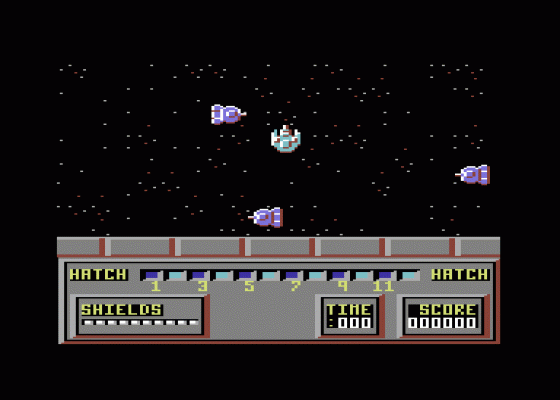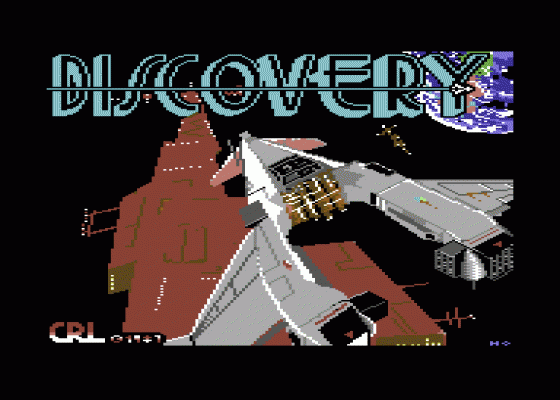Discovery
Out in the far reaches of space lies a giant, empty spaceship which has been drifting for over 2,000 years. The inert vessel is intact, save for a missing circuit board, the scattered components of which are located around the ship's individual hulls. If this board was assembled, the entire ship could be guided back to Earth.
The player is volunteered for the mission, and flies over the multi-directionally scrolling spaceship in search of the components. There are twelve docking ports dotted around the spaceship, and entering each one reveals a sub-game. The collection of these games include a horizontal 'Centipede', a 'Breakout' variant , a simplified 'Painter' game and even an implementation of Solitaire.
Each game has an objective which is completed within a time limit. If the attempt is successful, some missing components are added to the circuit board. If not, the player is expelled without reward and may only return when another game has been tackled.

Flying from port to port is a hazardous occupation as the giant ship's robot guardian fighters fly around and constantly fire at the player's ship, wearing down its shields with every accurate hit. Shields are replenished by successfully completing a subgame, but if they are are reduced to zero, a further hit proves fatal, and the mission ends.
When the entire circuit board is assembled and working, the mission is complete, and the ship is taken back to Earth.
SJ
The idea of disguising a series of sub-games within a main game isn't very original, but those included in Discovery are both varied and extremely playable. The mere fact that there are twelve of them is quite appealing, and there are only one or two which fail to please to any great extent. The graphics have that typical CRL feel to them - slightly chunky and bordering on the gaudy, but to be fair, some sections are very good. Ironically, the exterior space bathe is the weakest link, which looks as it it's using the jerky scrolling routine from CRL's earlier effort, Death Or Glory. Still, if you can ignore the space section, the sub-games included should provide plenty of entertainment.
PS

CRL have cheated a bit with Discovery, as it's merely a compilation of rather old and unoriginal games linked by a very basic shoot-'em-up. However, the puzzles are instantly playable and not too hard, so it's very easy to get into the action. Building up a circuit board is a novel idea, and with the wide variety of sub-games it provides quite a challenge. My only reservation is that a couple of the puzzles rely on random elements too much, making it difficult to develop an effective strategy to beat them. Discovery may look old hat, but it's extremely playable and the sub-games work well.
JR
There's certainly plenty of variety in CRL's latest release. The twelve sub-games are a mixed bag of puzzle, shoot-'em-up and reflex - and one seems to require 100% luck to complete it. The instructions are sparse, but working out how to play each game is what makes the action so enjoyable. The difficulty level is extremely well-balanced, and a few more components are collected with every game, making the action very compulsive. Discovery may be expensive, but it does offer plenty of long-term entertainment - try it out and surprise yourself.
Verdict
Presentation 67%
No instructions for the subgames (hence the title), but otherwise fine.

Graphics 64%
The majority of puzzle sequences are smart, although the space section is marred by ineffective sprites and awful scrolling.
Sound 55%
Decent title tune, but the spot effects are very weak.
Hookability 84%
Extremely easy to get into, although the lack of instructions for the sub-games doesn't help much.
Lastability 79%
The puzzles are varied and playable enough to provide a real incentive to complete the game.
Overall 77%
An enjoyable and strangely addictive collection of puzzle games.


 1st December 1987
1st December 1987


